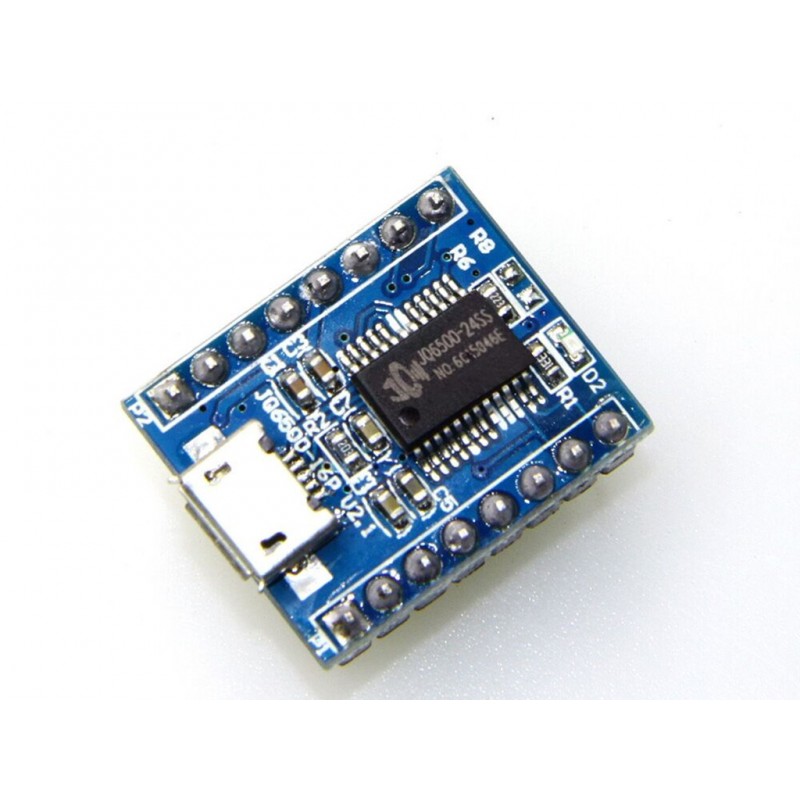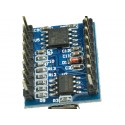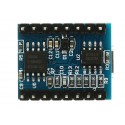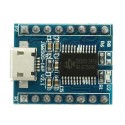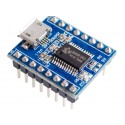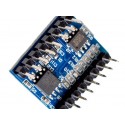Jq6500 Voice Sound Module Usb Replace One To 5 Way Mp3 Voice 16M
Rs. 190.00 Rs. 228.00
- Brand: https://sparks.gogo.co.nz/jq6500/index.html
- Product Code: SEN-PLAYBACK
- Availability: In Stock
- Price in reward points: 2
- For Bulk Order
 9962060070
9962060070
SPECIFICATIONS:
MP3 file format:
-supports all bit rates 11172-3 and ISO13813-3 layer3 audio decoding
-Sampling rate support(KHZ):8/11.025/12/16/22.05/24/32/44.1/48
-Support Normal, Jazz, Classic, Pop, Rock and other sound effects
| UART Interface | Standard serial port, TTL level, baud rate can be set |
| Input voltage | Power supply is at 3.2V-5V, 4.2V Power supply is the best |
| Rated current | 20ma |
| Size | Standard DIP16 package |
| Operating temperature | -40℃~70℃ |
| Humidity | 5% ~ 95% |
OVERVIEW:
-Support sampling rate (KHz): 8 / 11.025 / 12/16 / 22.05 / 24/32 / 44.1 / 48
-24-bit DAC output, dynamic range support 90dB, SNR support 85dB
-Full support FAT16, FAT32 file system, the largest support 32G TF card, support 32G U disk, 64M bytes NORFLASH
-A variety of control mode, parallel port control mode, serial port mode, AD button control mode
-Broadcast language spots, you can pause the background music is playing
-The audio data sorted by folder, up to 100 folders, every folder can be assigned 1000 songs
-30 level adjustable, 10 EQ adjustable
-You can plug in SPI flash, connect the computer can display spi flash letter to update the content;
-Can be controlled through the microcontroller serial port to play the specified music;
-In the key mode, you can play mode selection: can be interrupted, can not be interrupted, single cycle, large cycle;
-Can be interrupted: that is, in the process of playing, press the button will interrupt the current state to perform the new;
-Can not be interrupted: that is, in the process of playing, press any button is invalid, until the end of the play to play the current effective;
PACKAGE INCLUDES:
1 PCS x Jq6500 Voice Sound Module Usb Replace One To 5 Way Mp3 Voice 16M
https://sparks.gogo.co.nz/jq6500/index.html
//SOURCE CODE TAKEN FROM BELOW LINK
//https://www.ylmzcmlttn.com/2019/02/03/diy-mp3-player-jq6500-16p/
#include <Arduino.h>
#include <SoftwareSerial.h>
#include <JQ6500_Serial.h>
// Create the mp3 module object,
// Arduino Pin 8 is connected to TX of the JQ6500
// Arduino Pin 9 is connected to one end of a 1k resistor,
// the other end of the 1k resistor is connected to RX of the JQ6500
// If your Arduino is 3v3 powered, you can omit the 1k series resistor
JQ6500_Serial mp3(8,9);
void setup() {
// put your setup code here, to run once:
Serial.begin(9600);
mp3.begin(9600);
mp3.reset();
statusAndHelpOutput();
}
void loop() {
byte b;
if(Serial.available())
{
b = Serial.read();
switch(b)
{
case 'p': Serial.println("Play"); mp3.play(); return;
case 'r': Serial.println("Restart"); mp3.restart(); return;
case ' ': Serial.println("Pause"); mp3.pause(); return;
case '>': Serial.println("Next"); mp3.next(); return;
case '<': Serial.println("Prev"); mp3.prev(); return;
case ']': Serial.println("Next Folder"); mp3.nextFolder(); return;
case '[': Serial.println("Prev Folder"); mp3.prevFolder(); return;
case '+': Serial.println("Vol +"); mp3.volumeUp(); return;
case '-': Serial.println("Vol -"); mp3.volumeDn(); return;
case 'm': Serial.println("Vol 0"); mp3.setVolume(0); return;
case 'v':
{
char volBuff[10];
memset(volBuff, 0, sizeof(volBuff));
Serial.readBytesUntil('\n',volBuff, sizeof(volBuff)-1);
mp3.setVolume(max(0,min(30, atoi(volBuff))));
Serial.print("Vol ");
Serial.println(max(0,min(30, atoi(volBuff))));
}
return;
case 'e':
{
do
{
while(!Serial.available()); // Wait
b = Serial.read();
if(b != ' ') break; // Allow "e N" or "eN" etc...
} while(1);
Serial.print("Equalizer ");
switch(b)
{
case 'N': Serial.println("Normal"); mp3.setEqualizer(MP3_EQ_NORMAL); break;
case 'P': Serial.println("Pop"); mp3.setEqualizer(MP3_EQ_POP); break;
case 'R': Serial.println("Rock"); mp3.setEqualizer(MP3_EQ_ROCK); break;
case 'J': Serial.println("Jazz"); mp3.setEqualizer(MP3_EQ_JAZZ); break;
case 'C': Serial.println("Classic"); mp3.setEqualizer(MP3_EQ_CLASSIC); break;
case 'B': Serial.println("Bass"); mp3.setEqualizer(MP3_EQ_BASS); break;
}
}
return;
case 'l':
{
do
{
while(!Serial.available()); // Wait
b = Serial.read();
if(b != ' ') break; // Allow "e N" or "eN" etc...
} while(1);
Serial.print("Loop ");
switch(b)
{
case 'A': Serial.println("All"); mp3.setLoopMode(MP3_LOOP_ALL); break; // Plays the tracks one after another and repeats
case 'F': Serial.println("Folder"); mp3.setLoopMode(MP3_LOOP_FOLDER); break; // Loop within folder
case 'O': Serial.println("One (repeat playing same file)"); mp3.setLoopMode(MP3_LOOP_ONE); break; // | These seem to do the same, repeat the same track over and over
case 'R': Serial.println("??? - Don't know what it means exactly, in the datasheet it is \"RAM\""); mp3.setLoopMode(MP3_LOOP_RAM); break; //-
case 'N':
case 'S': Serial.println("None (play file and stop)"); mp3.setLoopMode(MP3_LOOP_ONE_STOP); break; // Default, plays track and stops
}
}
return;
case 's':
{
do
{
while(!Serial.available()); // Wait
b = Serial.read();
if(b != ' ') break; // Allow "e N" or "eN" etc...
} while(1);
Serial.print("Source ");
switch(b)
{
case 'S': Serial.println("SD Card (if available)."); mp3.setSource(MP3_SRC_SDCARD); break;
case 'B': Serial.println("on board memory.");mp3.setSource(MP3_SRC_BUILTIN); break;
}
}
return;
case 'f':
{
char fnumBuff[10];
memset(fnumBuff, 0, sizeof(fnumBuff));
Serial.readBytesUntil('\n',fnumBuff, sizeof(fnumBuff)-1);
unsigned int fnum = strtoul(fnumBuff, NULL, 10);
Serial.println();
Serial.print("Play file #");
Serial.print(fnum);
Serial.println(F(" (if it exists)."));
mp3.playFileByIndexNumber(fnum); // 48 == ord('0')
return;
}
return;
case 'F':
{
char fnumBuff[10];
memset(fnumBuff, 0, sizeof(fnumBuff));
Serial.readBytesUntil('/',fnumBuff, sizeof(fnumBuff)-1);
unsigned int folnum = strtoul(fnumBuff, NULL, 10);
memset(fnumBuff, 0, sizeof(fnumBuff));
Serial.readBytesUntil('\n',fnumBuff, sizeof(fnumBuff)-1);
unsigned int fnum = strtoul(fnumBuff, NULL, 10);
fnum = max(1,min(fnum, 999));
folnum = max(1,min(folnum, 99));
Serial.print("Play ");
if(folnum < 10) Serial.print('0');
Serial.print(folnum);
Serial.print('/');
if(fnum < 10) Serial.print("00");
else if(fnum < 10) Serial.print('0');
Serial.print(fnum);
Serial.println(".mp3 (if it exists).");
mp3.playFileNumberInFolderNumber(folnum, fnum); // 48 == ord('0')
}
return;
case '?': statusAndHelpOutput(); return;
case 'S': Serial.println("Sleep"); mp3.sleep(); return;
case 'z': Serial.println("Reset"); mp3.reset(); return;
}
}
static unsigned long m = millis();
if(millis() > 1000 && m < (millis() - 1000))
{
if((mp3.getStatus() == MP3_STATUS_PLAYING))
{
Serial.print(F("Playing, Current Position: "));
Serial.print(mp3.currentFilePositionInSeconds());
Serial.print(F("s / "));
Serial.print(mp3.currentFileLengthInSeconds());
Serial.println('s');
}
m = millis();
}
}
void statusAndHelpOutput()
{
Serial.println();
Serial.println(F("JQ6500 MP3 Player Demo"));
Serial.println(F("~~~~~~~~~~~~~~~~~~~~~~~~~~~~~~~~~~~~~~~~~~~~~~~~~~~~~~~~~~~~~~~~~~~~~~~~~~~~~~~~~~~~~~~~~~~~~~"));
Serial.print(F("Status : "));
switch(mp3.getStatus())
{
case MP3_STATUS_STOPPED: Serial.println(F("Stopped")); break;
case MP3_STATUS_PLAYING: Serial.println(F("Playing")); break;
case MP3_STATUS_PAUSED: Serial.println(F("Paused")); break;
}
Serial.print(F("Volume (0-30) : "));
Serial.println(mp3.getVolume());
Serial.print(F("Equalizer : "));
switch(mp3.getEqualizer())
{
case MP3_EQ_NORMAL: Serial.println(F("Normal")); break;
case MP3_EQ_POP: Serial.println(F("Pop")); break;
case MP3_EQ_ROCK: Serial.println(F("Rock")); break;
case MP3_EQ_JAZZ: Serial.println(F("Jazz")); break;
case MP3_EQ_CLASSIC: Serial.println(F("Classic")); break;
case MP3_EQ_BASS: Serial.println(F("Bass")); break;
}
Serial.print(F("Loop Mode : "));
switch(mp3.getLoopMode())
{
case MP3_LOOP_ALL: Serial.println(F("Play all tracks, then repeat.")); break;
case MP3_LOOP_FOLDER: Serial.println(F("Play all tracks in folder, then repeat.")); break;
case MP3_LOOP_ONE: Serial.println(F("Play one track then repeat (loop track).")); break;
case MP3_LOOP_RAM: Serial.println(F("Unknown function exactly, seems to play one track then repeat?")); break;
case MP3_LOOP_ONE_STOP: Serial.println(F("Play one track then stop.")); break;
}
Serial.println();
Serial.print(F("# of On Board Memory Files : "));
Serial.println(mp3.countFiles(MP3_SRC_BUILTIN));
Serial.print(F("\"Current\" On Board Memory File Index: "));
Serial.println(mp3.currentFileIndexNumber(MP3_SRC_BUILTIN));
Serial.println();
Serial.print(F("# of SD Card Files : "));
Serial.println(mp3.countFiles(MP3_SRC_SDCARD));
Serial.print(F("# of SD Card Folders : "));
Serial.println(mp3.countFolders(MP3_SRC_SDCARD));
Serial.print(F("\"Current\" SD Card File Index: "));
Serial.println(mp3.currentFileIndexNumber(MP3_SRC_SDCARD));
Serial.print(F("\"Current\" SD Card File Name : "));
char buff[120];
mp3.currentFileName(buff, sizeof(buff));
Serial.println(buff);
Serial.println();
Serial.println(F("Controls (type in serial monitor and hit send): "));
Serial.println(F("~~~~~~~~~~~~~~~~~~~~~~~~~~~~~~~~~~~~~~~~~~~~~~~~~~~~~~~~~~~~~~~~~~~~~~~~~~~~~~~~~~~~~~~~~~~~~~"));
Serial.println(F("? Display this menu.\n"));
Serial.println(F("p Play\t\t> Next\t\t< Prev\n[space] Pause\tr Restart from start of file\n] Next folder\t[ Prev folder\n"));
Serial.println(F("f[1-65534] Play file by (FAT table) index number\nF[01-99]/[001-999].mp3 Play [001-999].mp3 in folder [01-99]\n"));
Serial.println(F("+ Vol up\t- Vol down\tm Mute\nv[0-30] Set volume\n\ne[N/P/R/J/C/B] Equalizer (N)ormal, (P)op, (R)ock, (J)azz, (C)lassic, (B)ass\nl[A/F/O/R/N] Loop (A)ll, (F)older, (O)ne, (R)???, (N)o Loop\ns[S/B] Switch to (S)D Card/(B)uilt In Memory\n\n"));
}
15 days

